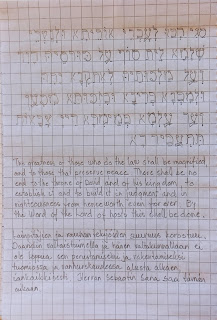Verattaessa Jes. 9: 5, 6:n jakeita heprean ja aramean tekstiin selviää, että ihmiskunnalle annetun Poika-lapsen herraus on hallintavaltaa, joka perustuu lain noudattamiseen. Jesajan ennustama Messias otti lain noudattaakseen sitä kaikessa. Hänen täydellisen kuuliaisuutensa ansiosta Daavidin kuningaskunta tulee pysymään ikuisesti. Tämän ihmeen sai aikaan aramean tekstin mukaan Sana eli Memra (מימרא). Ja heprean קנאת (qinat) merkitsee intoa, kiivautta, kiihkoa, mustasukkaisuutta, jonka vallassa Jumala haluaa saada luomansa ihmisen takaisin Eedeniin.
When comparing Isa. 9: 5, 6 in the Hebrew and Aramaic texts it makes clear that the dominion of the Son-child given to mankind means His government based on obedience to the law. The Messiah prophesied by Isaiah took the law to obey it in all things. Thanks to His complete obedience, the Kingdom of David will last forever. According to the Aramaic text, this miracle was accomplished by the Word or Memra (מימרא). And the Hebrew קנאת (qinat) signifies the enthusiasm, the fervor, the jealousy under which God wants to get the man He once created back to Eden.
💛 💛 💛 💛 💛 💛 💛 💛 💛 💛 💛 💛 💛 💛 💛 💛 💛 💛 💛 💛 💛
Jumalan (Minä Olen) ja Hänen Poikansa (Minä olen Hän) hallintavalta/herraus perustuu Jumalan lain kunnioittamiseen ja noudattamiseen ja sapatin pyhänä pitämiseen.
The power/government of God (I Am) and His Son (I am He) is based on honouring and obeying of God's law and on keeping the Sabbath holy.
Jeeshua, Ihmisen Poika, ei tullut Herraksi vaan Palvelijaksi, sillä Hän ei tullut palveltavaksi, vaan palvelemaan ja antamaan henkensä lunnaiksi monen edestä (Matt. 20: 28). Jeeshuan alentumisessa piilee Sanan/Memran voima (Joh. 1: 1 - 3, 14)! Sapatti asetettiin ihmistä varten (Mark. 2: 27), ja Lunastajana (Joh. 3: 16) Jeeshua on אדון השבת (Adon ha-shabaat), "sapatin herra" (Matt. 12: 8; Mark. 2: 28; Luuk. 6: 5). Sapatti on sekä luomisen että lunastuksen muistopäivä!
Jeshua, the Son of Man, did not become the Lord but the Servant, for He did not come to be ministered but to minister and give His life as a ransom for many (Matt. 20:28). The descent of Jeshua means the power of the Word/Memra (John 1: 1 - 3, 14)! The Sabbath was instituted for man (Mark 2:27), and as the Redeemer (John 3:16), Jeshua is אדון השבת (Adon ha-shabat), "the lord of the Sabbath" (Matt. 12: 8; Mark 2: 28; Luke 6: 5). The Sabbath is a day of remembrance for both creation and redemption!
Jeeshuan alennustila enkeleitä halvemmaksi oli vain väliaikainen (Hepr. 2: 7, 9). Alentumisensa jälkeen Jeeshuaa kutsutaan toisessa adventissa nimellä אדני האדנים (Adonai ha-adonim) eli ”herrojen Herra” (Ilm. 19: 16).
The state of Jeshu's descent lower angels was only temporary (Heb. 2: 7, 9). After his humiliation, in the second Advent, Jeshua is called אדני האדנים (Adonai ha-adonim) or “Lord of lords” (Rev. 19:16).
Lain ja sapattikäskyn muuttamisen ja rikkomisen takana on valta/herraus/dominion, joka korottaa sunnuntaita (Domenica) universaalina lepopäivänä. Tuo yliherruus (dominion) keskittyy tetragrammiin, יהוה, sillä HERRA on latinaksi DOMINUS.
Behind changing and breaking the law and the Sabbath commandment is power/domination, which elevates Sunday (Domenica) as a universal day of rest. That supremacy (Dominion) is focused on the Tetragrammaton, יהוה, for the LORD is in Latin DOMINUS.
💛 💛 💛 💛 💛 💛 💛 💛 💛 💛 💛 💛 💛 💛 💛 💛 💛 💛 💛 💛 💛
Kannattaa huomioida, miten arameassa lueteellaan Messiaan nimitykset:
"Hänen nimeään kutsutaan ikuisuudesta ihmeelliseksi, mahtavaksi iankaikkisesti eläväksi Jumalaksi, Messiaaksi, jonka rauha tulee olemaan suuri hänen aikanaan." Ristiriitaa ja väittelyä synnyttänyt ”Iankaikkinen Isä” puuttuu kokonaan!
It is worth noting how in Aramaic the names of the Messiah are listed:
"His name is called from eternity wonderful, the mighty God who liveth to eternity, the Messiah whose peace shall be great upon us in his days". “Eternal Father” that has caused controversy and discussion is completely missing!




Ei kommentteja:
Lähetä kommentti